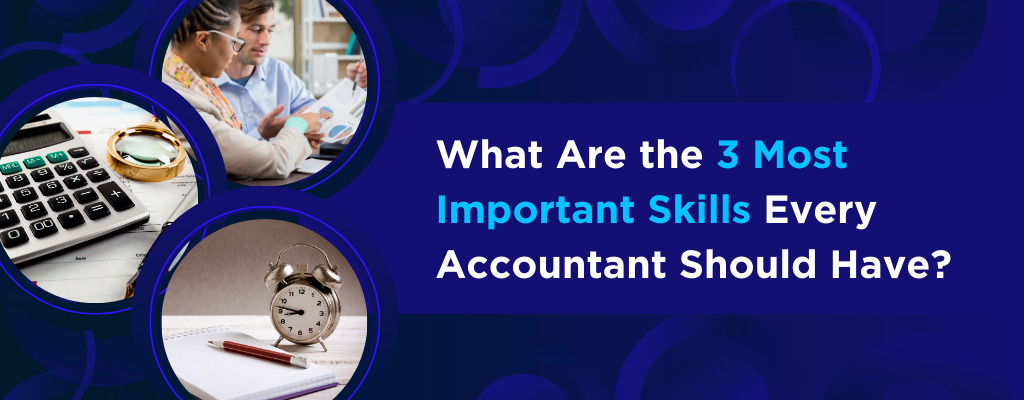What Are the 3 Most Important Skills Every Accountant Should Have?
When we talk about any job, it requires a combination of soft and hard skills. Your soft skills help you do a job better, while, your hard skills, also known as technical expertise, help you get the job in the first place.
When it comes to the most critical skills required for an accountant, it entails an educational degree and various certificates that employers look for these days. But in addition, companies are now looking for three essential soft skills that accountants must have. Let’s take a look at these three skills. But before we do that, here are the fundamental or technical skills required to become an accountant:
- An undergraduate degree majoring in accounting.
- A master’s degree is not required. It is, however, appreciated by companies.
- You need to pass a competitive exam organised by the accounting organisation in your country.
- Knowledge of tax preparation, financial forecasting, database-relevant software, etc.
Now, while you may have all these hard skills that make you a good accountant, successful accountants have something extra. It is their soft skills that propel them to excel in their career. It would help if you had a solid collaboration between your hard and soft skills to make you a successful accountant.
Here are the three skills you need to master to become a top-class accountant:
Analytical Skills

Accounting is not just about crunching numbers; you should be able to do deep financial analysis for businesses. This requires a critical mind that analyses each difficult situation intelligently. Your analytical skills must be able to combine with your in-depth accounting knowledge to give the best financial advice and solutions.
An accountant’s top job is to analyse financial problems, list challenges, and give the best possible solution. It would help if you had a problem-solving mindset. You will be working with the top-level decision-makers of a business, who will heed your advice on all significant financial matters. That is why developing your analytical skills should be your top priority when becoming an accountant.
An accountant is asked to think not only critically but also creatively. They are finding solutions to complex financial problems and need a creative approach. Some critical decisions in a company based on an accountant’s advice are hiring more people, making business expansion plans, getting more loans or investments, etc.
Pay more attention to details and come up with creative solutions to problems that a conservative approach cannot solve to sharpen your analytical skills. You must also never hesitate to learn from more experienced accountants.
Time Management

Managing time is crucial for accountants because it helps with audits and tax filing. A company has yearly and monthly deadlines to complete tasks related to its finances. They need their finances to be organised systematically to prepare a final financial report. All of this work has deadlines. If your time management skills are not top-notch, you may face problems in your profession.
Master excel in managing your time efficiently. Excel spreadsheets are great for saving time while doing lengthy calculations. Make use of online calendars to schedule meetings and calls. They are also an excellent tool for setting deadlines for your projects. They help remind you when your work is due, and you will be able to work towards your goal in a much more synchronised manner.
Another great way to hone your time management skills is by making a to-do list every morning and utilising software to automate some of your data entry-based manual tasks. Meeting deadlines is an integral part of an accountant’s job. To master this skill, you need both patience and consistency.
Time management can help you accomplish your work in less time, provided that you decide to be more productive and analytical in your work. Never hesitate to ask for help. Delegate your tasks if you think you have too much on your plate. It is better to share responsibilities than to miss important deadlines.
Critical Thinking

As an accountant, you are bound to encounter errors and discrepancies. How you handle it differentiates the best accountants from the good ones. There are two variables associated with mistakes and discrepancies. The first is identifying the error in financial data. If not identified on time, the business could have serious ramifications.
The second variable is finding the best possible solution for the identified errors. Resolving problems takes both time and critical thinking skills. As an accountant, you need to hone your necessary thinking skills to factor in all the risks and complications of a business.
Employers value an accountant who can think critically and manage to give them the right solution during pressing financial conditions. Planning a financial strategy and business expansion plan can be difficult for you if you do not develop your critical thinking skills at an early stage.
It would help if you asked more of the “how” and “why” questions to hone your critical thinking skills. There are tonnes of books written by great accountants that will come in handy for you. You may also pay attention to other well-known accountants working with you to learn the art of critical thinking.
To Sum It Up
An accountant is the guardian of financial information for a company. Their skills can help companies save taxes, make more profits, and improve overall scalability. But this is only possible if the accountant has the soft skills needed to become a successful accountant in addition to their hard skills.
In addition to the skills mentioned in this blog, an accountant must have clear communication skills, a teamwork spirit, and excellent organisational skills. All of these can be cultivated with practice and patience.
Lifelong learning is part of most professions now. Accountants, too, need to be on their toes and learn new evolving skills and technologies that can make them more successful in their careers. After all, you can only become a true asset to businesses when you have excellent skills!

